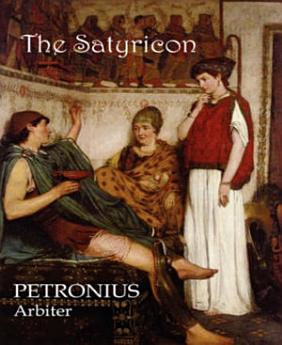The Satyricon
Jun 2019 · BookRix
Kitabu pepe
248
Kurasa
family_home
Kimetimiza masharti
info
reportUkadiriaji na maoni hayajahakikishwa Pata Maelezo Zaidi
Kuhusu kitabu pepe hiki
The Satyricon is a Latin work of fiction in a mixture of prose and poetry. It is believed to have been written by Gaius Petronius Arbiter, though the manuscript tradition identifies the author as a certain Titus Petronius. As with the Metamorphoses of Apuleius, classical scholars often describe it as a "Roman novel", without necessarily implying continuity with the modern literary form. The surviving portions of the text detail the misadventures of the narrator, Encolpius, and his lover, a handsome sixteen-year-old boy named Giton. Throughout the novel, Encolpius has a hard time keeping his lover faithful to him as he is constantly being enticed away by others. Encolpius's friend Ascyltus (who seems to have previously been in a relationship with Encolpius) is another major character.
Of the many masterpieces which classical antiquity has bequeathed to modern times, few have attained, at intervals, to such popularity; few have so gripped the interest of scholars and men of letters, as has this scintillating miscellany known as the Satyricon, ascribed by tradition to that Petronius who, at the court of Nero, acted as arbiter of elegance and dictator of fashion. The flashing, wit, the masterly touches which bring out the characters with all the detail of a fine old copper etching; the marvelous use of realism by this, its first prophet; the sure knowledge of the perspective and background best adapted to each episode; the racy style, so smooth, so elegant, so simple when the educated are speaking, beguile the reader and blind him, at first, to the many discrepancies and incoherences with which the text, as we have it, is marred. The more one concentrates upon this author, the more apparent these faults become and the more one regrets the lacunae in the text. Notwithstanding numerous articles which deal with this work, some from the pens of the most profound scholars, its author is still shrouded in the mists of uncertainty and conjecture. He is as impersonal as Shakespeare, as aloof as Flaubert, in the opinion of Charles Whibley, and, it may be added, as genial as Rabelais; an enigmatic genius whose secret will never be laid bare with the resources at our present command.
Of the many masterpieces which classical antiquity has bequeathed to modern times, few have attained, at intervals, to such popularity; few have so gripped the interest of scholars and men of letters, as has this scintillating miscellany known as the Satyricon, ascribed by tradition to that Petronius who, at the court of Nero, acted as arbiter of elegance and dictator of fashion. The flashing, wit, the masterly touches which bring out the characters with all the detail of a fine old copper etching; the marvelous use of realism by this, its first prophet; the sure knowledge of the perspective and background best adapted to each episode; the racy style, so smooth, so elegant, so simple when the educated are speaking, beguile the reader and blind him, at first, to the many discrepancies and incoherences with which the text, as we have it, is marred. The more one concentrates upon this author, the more apparent these faults become and the more one regrets the lacunae in the text. Notwithstanding numerous articles which deal with this work, some from the pens of the most profound scholars, its author is still shrouded in the mists of uncertainty and conjecture. He is as impersonal as Shakespeare, as aloof as Flaubert, in the opinion of Charles Whibley, and, it may be added, as genial as Rabelais; an enigmatic genius whose secret will never be laid bare with the resources at our present command.
Kadiria kitabu pepe hiki
Tupe maoni yako.
Kusoma maelezo
Simu mahiri na kompyuta vibao
Sakinisha programu ya Vitabu vya Google Play kwa ajili ya Android na iPad au iPhone. Itasawazishwa kiotomatiki kwenye akaunti yako na kukuruhusu usome vitabu mtandaoni au nje ya mtandao popote ulipo.
Kompyuta za kupakata na kompyuta
Unaweza kusikiliza vitabu vilivyonunuliwa kwenye Google Play wakati unatumia kivinjari cha kompyuta yako.
Visomaji pepe na vifaa vingine
Ili usome kwenye vifaa vya wino pepe kama vile visomaji vya vitabu pepe vya Kobo, utahitaji kupakua faili kisha ulihamishie kwenye kifaa chako. Fuatilia maagizo ya kina ya Kituo cha Usaidizi ili uhamishe faili kwenye visomaji vya vitabu pepe vinavyotumika.








